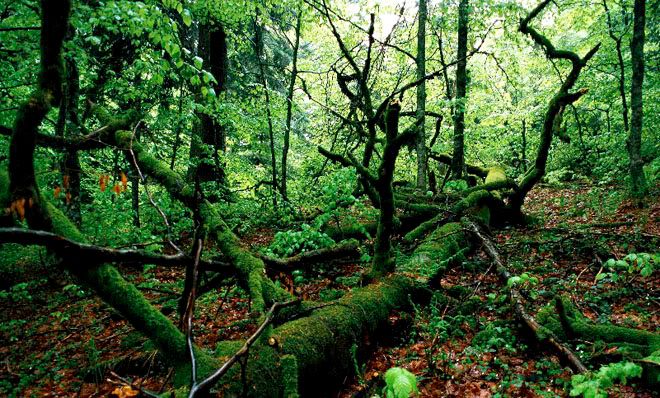 landscapes of the lost and found
landscapes of the lost and foundCharles Sanders Peirce said that a man who gets up on the wrong side of the bed attributes wrong-sidedness to every object he meets, and it is true that moods imprint themselves on the objects one encounters during the day. But similarly objects too have the capacity to imprint themselves onto a person's moods. For instance if you encounter a gnarly object like some old ivy twisting round the boughs of a fallen tree, your thoughts are liable to become somewhat gnarly and twisty themselves.
How those feelings are grasped and representation in language can in turn influence ways of thinking and feeling. Thus, someone who writes on the top of a mountain is going to have something of the mountain in their writing, and conversely someone who writes in the tangle of a forest is going to have some of the forest in their writing.
Although here I think the point cannot be taken too far. Sometimes people write precisely for the reason that they want to escape where they are. Does a person who writes in front of blank walls produce blank writing? No. Does a person who writes in front of a computer monitor produce monitorish prose? Possibly???
A friend of mine has taken to writing with a typewriter, and is eagerly advocating that I do the same; something about the percussive rhythm of the keys hammering out the prose that, apparently, leads to a punchier writing style. To write on the word processor is of course not really writing at all. For instance, I believe some Muslim clerics were charged with deciding whether is was allowable to word-process the Koran. The controversy was because it was forbidden that the word of God be tampered with in any way for instance with a spell checker – luckily, it was decided that the word of the Koran could not be said to be words at all until one pressed print.
Gnarly objects producing gnarly thoughts. This is the non-poetic justification for symbolism. For instance think of the mise en scène of Dr Caligari. Or when the hero of a fairy tale is lost in and alone and is described as running though a tangled landscape of thorns. This is the landscape of the lost. Just as the sweet grass picket fence cosy kitchen fire of fairy tale endings is the landscape of the found.
1 comment:
Hello Roderick,
Like your blog. A suggestion on comments useage: turn on word verification to prevent these irritating spammers.
When I spend time in my greenhouse my writing is all warm and fuzzy, when I work beneath the open sky my writing is wide open. So subliminal cues are definitely a force playing upon my subconscious, thanks for pointing that out. I wonder if the living world doesn't have a stronger influence on our words at times than the world of words itself does. I don't think I've ever noticed myself picking up verbal moods from other bloggers but a snowy day definitely makes my blog entries quieter.
Post a Comment